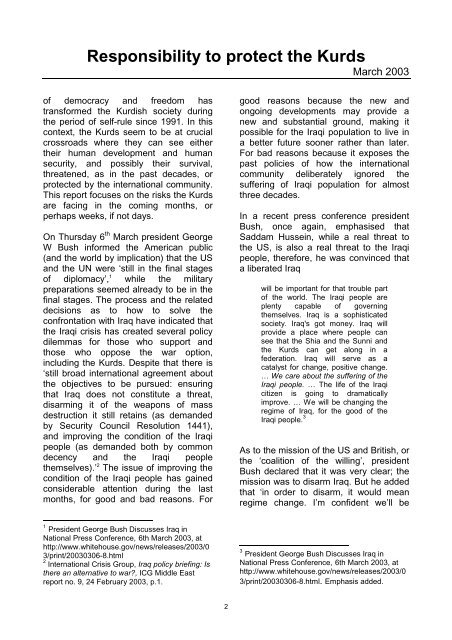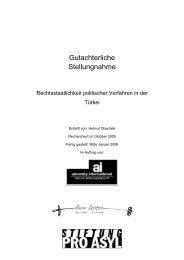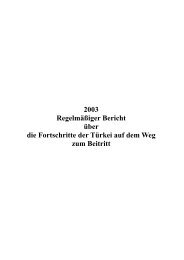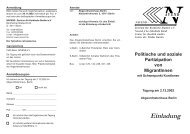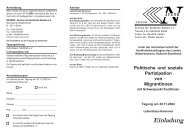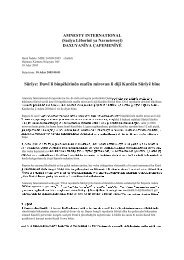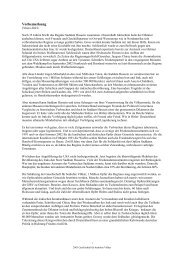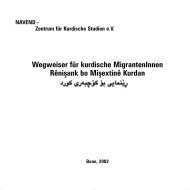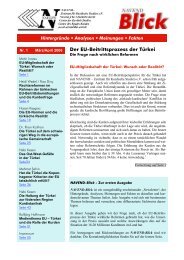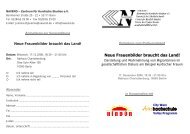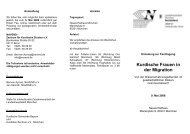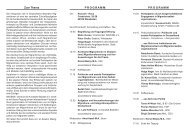Responsibility to protect the Kurds - Navend
Responsibility to protect the Kurds - Navend
Responsibility to protect the Kurds - Navend
You also want an ePaper? Increase the reach of your titles
YUMPU automatically turns print PDFs into web optimized ePapers that Google loves.
<strong>Responsibility</strong> <strong>to</strong> <strong>protect</strong> <strong>the</strong> <strong>Kurds</strong><br />
March 2003<br />
of democracy and freedom has<br />
transformed <strong>the</strong> Kurdish society during<br />
<strong>the</strong> period of self-rule since 1991. In this<br />
context, <strong>the</strong> <strong>Kurds</strong> seem <strong>to</strong> be at crucial<br />
crossroads where <strong>the</strong>y can see ei<strong>the</strong>r<br />
<strong>the</strong>ir human development and human<br />
security, and possibly <strong>the</strong>ir survival,<br />
threatened, as in <strong>the</strong> past decades, or<br />
<strong>protect</strong>ed by <strong>the</strong> international community.<br />
This report focuses on <strong>the</strong> risks <strong>the</strong> <strong>Kurds</strong><br />
are facing in <strong>the</strong> coming months, or<br />
perhaps weeks, if not days.<br />
On Thursday 6 th March president George<br />
W Bush informed <strong>the</strong> American public<br />
(and <strong>the</strong> world by implication) that <strong>the</strong> US<br />
and <strong>the</strong> UN were ‘still in <strong>the</strong> final stages<br />
of diplomacy’, 1 while <strong>the</strong> military<br />
preparations seemed already <strong>to</strong> be in <strong>the</strong><br />
final stages. The process and <strong>the</strong> related<br />
decisions as <strong>to</strong> how <strong>to</strong> solve <strong>the</strong><br />
confrontation with Iraq have indicated that<br />
<strong>the</strong> Iraqi crisis has created several policy<br />
dilemmas for those who support and<br />
those who oppose <strong>the</strong> war option,<br />
including <strong>the</strong> <strong>Kurds</strong>. Despite that <strong>the</strong>re is<br />
‘still broad international agreement about<br />
<strong>the</strong> objectives <strong>to</strong> be pursued: ensuring<br />
that Iraq does not constitute a threat,<br />
disarming it of <strong>the</strong> weapons of mass<br />
destruction it still retains (as demanded<br />
by Security Council Resolution 1441),<br />
and improving <strong>the</strong> condition of <strong>the</strong> Iraqi<br />
people (as demanded both by common<br />
decency and <strong>the</strong> Iraqi people<br />
<strong>the</strong>mselves).’ 2 The issue of improving <strong>the</strong><br />
condition of <strong>the</strong> Iraqi people has gained<br />
considerable attention during <strong>the</strong> last<br />
months, for good and bad reasons. For<br />
1 President George Bush Discusses Iraq in<br />
National Press Conference, 6th March 2003, at<br />
http://www.whitehouse.gov/news/releases/2003/0<br />
3/print/20030306-8.html<br />
2 International Crisis Group, Iraq policy briefing: Is<br />
<strong>the</strong>re an alternative <strong>to</strong> war?, ICG Middle East<br />
report no. 9, 24 February 2003, p.1.<br />
2<br />
good reasons because <strong>the</strong> new and<br />
ongoing developments may provide a<br />
new and substantial ground, making it<br />
possible for <strong>the</strong> Iraqi population <strong>to</strong> live in<br />
a better future sooner ra<strong>the</strong>r than later.<br />
For bad reasons because it exposes <strong>the</strong><br />
past policies of how <strong>the</strong> international<br />
community deliberately ignored <strong>the</strong><br />
suffering of Iraqi population for almost<br />
three decades.<br />
In a recent press conference president<br />
Bush, once again, emphasised that<br />
Saddam Hussein, while a real threat <strong>to</strong><br />
<strong>the</strong> US, is also a real threat <strong>to</strong> <strong>the</strong> Iraqi<br />
people, <strong>the</strong>refore, he was convinced that<br />
a liberated Iraq<br />
will be important for that trouble part<br />
of <strong>the</strong> world. The Iraqi people are<br />
plenty capable of governing<br />
<strong>the</strong>mselves. Iraq is a sophisticated<br />
society. Iraq's got money. Iraq will<br />
provide a place where people can<br />
see that <strong>the</strong> Shia and <strong>the</strong> Sunni and<br />
<strong>the</strong> <strong>Kurds</strong> can get along in a<br />
federation. Iraq will serve as a<br />
catalyst for change, positive change.<br />
… We care about <strong>the</strong> suffering of <strong>the</strong><br />
Iraqi people. … The life of <strong>the</strong> Iraqi<br />
citizen is going <strong>to</strong> dramatically<br />
improve. … We will be changing <strong>the</strong><br />
regime of Iraq, for <strong>the</strong> good of <strong>the</strong><br />
Iraqi people. 3<br />
As <strong>to</strong> <strong>the</strong> mission of <strong>the</strong> US and British, or<br />
<strong>the</strong> ‘coalition of <strong>the</strong> willing’, president<br />
Bush declared that it was very clear; <strong>the</strong><br />
mission was <strong>to</strong> disarm Iraq. But he added<br />
that ‘in order <strong>to</strong> disarm, it would mean<br />
regime change. I’m confident we’ll be<br />
3 President George Bush Discusses Iraq in<br />
National Press Conference, 6th March 2003, at<br />
http://www.whitehouse.gov/news/releases/2003/0<br />
3/print/20030306-8.html. Emphasis added.


